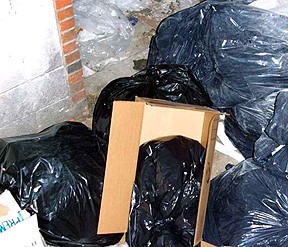
Taking out the trash
Tucked deep in the heart of the Dawson Center Building sits Art Wernersbach Jr., the services manager for campus planning and plant operations. Those who report to him, Sean Miller, Martin Anderson and Charles Flowers, all have the difficult job of collecting the trash SMU produces.
As the saying goes, though, one man’s trash is another’s treasure. Both Miller and Anderson have been with SMU for over five years and have seen their fair share of bizarre and interesting trash.
The university’s trash compactor, called “The Red Monster,” collects enough waste to fill up the truck once a week.
Miller’s fondest finds come from the Meadows School of the Arts refuge. He once found a World War II replica bomb weighing over 50 pounds.
“I took it home,” Miller said. When asked what he did with the model, he said he later donated it to the Commemorative Air Force.
Being trash collectors for SMU has paid off for Miller and Anderson. Together they have found over $500 in unclaimed money.
“Once someone just threw away water jugs full of pennies and silver coins,” Miller said.
Throughout their careers at SMU, they’ve also stumbled across laptops, palm pilots, cell phones and CD players – all in working order.
Anderson says the best time for finding stuff is when everyone is moving out of the dorms at the end of the school year.
“We find bed sheets, mattresses and pillows all just thrown out,” he said.
Wernersbach, who refers to the Miller and Anderson as “Sanford and Son”, requests that the pair take all finds to the SMU police station for possible retrieval.
During the year, the trash from the residence halls is mainly beer bottles and wasted food, Miller says.
All of SMU’s trash is taken to the University Park transfer center and then to the landfill in Garland.
Wernersback believes that SMU sends too much trash to the dump and encourages students to recycle more, especially in the residence halls. Virginia-Snider produces no recycling bags, while Boaz, Perkins and Smith each produce just one bag of recyclables each week.
Wernersbach is passionate about educating students in recycling. Not only does it make life easier for him and his colleagues, but it will help the environment as well.








